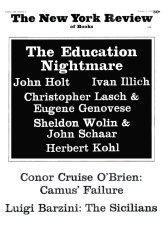In response to:
Tribal Gods from the July 31, 1969 issue
To the Editors:
The Freudian typo (Anglophone into Anglophobe) in D. A. N. Jones’s piece on literature about black Africa [NYR, July 31] is funny but his implication that African writers have to be approached through some Westernoid sort of worked up scholarly apparatus is seriously misleading. I have taught the Litto anthology of plays (which deserves more than the J. P. Clark allusion it got) and neither graduate nor undergraduate found a blur of obscurities. Moreover in Soyinka’s plays—as for example The Strong Breed (available free from Modern Talking Picture service)—whatever is strange (“the carrier” or scapegoat) becomes easily accessible through dramatic action itself. This is not to say that African literature is free of critical problems. But the complexity of many of its best writers is translucent—as in the integration of esoteric Ibo folklore in the fiction of Chinua Achebee. Residual obscurities are no more formidable than ruralia in the fiction of George Eliot.
Patrick D. Hazard
Philadelphia
D.A.N Jones replies:
I wasn’t asking for a “scholarly apparatus” for all African writers. I merely want Wole Soyinka to supply more and longer footnotes to his own work, especially to his poems. The plays, as I stated, are easier to follow, and there’s certainly no great difficulty in The Strong Breed. But what about Kongi’s Harvest?
When the gbedu rouses
The dead in oshugbo…
The last word refers to the Oro cult—which crops up again in that very allusive play, A Dance of the Forests. Many readers will need to know what Oro is. Also Obatala:
Even so did the god enjoin
Whose hands of chalk
Have formed the cripple.
We need to know which god. This is not a matter of “African writing” but of one learned and allusive poet. Just so, Thom Gunn writes “Here in a cave the Paphlagonian king…” Who he? Learned poets should not be too modest to offer informative notes about their subject-matter, as Byron and William Empson have done.
This Issue
October 9, 1969



